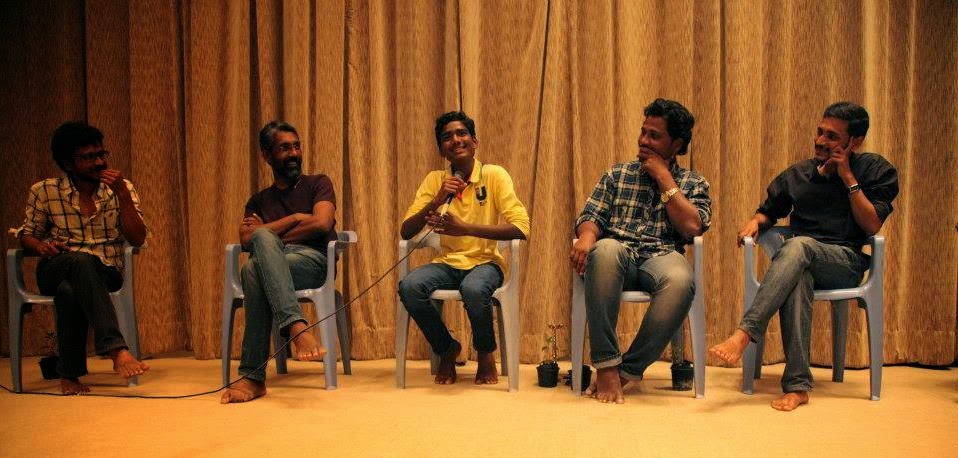By Praveen Lulekar
Let’s look at Taptapadi like an
academic project for a film student. The professor tells you to create a film
that shows all the camera angles you’ve learnt, cast lead actors that are
‘still learning’ (so that you can master the skill of extracting acting) and of
course, create it before the term end. As a tip, he also tells you to select a
story that is fool proof, may be by a good writer. In a stroke of passion,
instead of the more film-suited novels of Chetan Bhagat or Ravinder Singh, you
directly get your hands on Rabindranath Tagore. You didn’t notice the
professor’s raised eyebrows that had everyone from Satyajit Ray to Rituparno
Ghosh, who touched Tagore so thoughtfully, in retrospective.
Director Sachin Nagargoje’s first
directorial attempt is about this massive task going wrong. The film is based
on Tagore’s short story Drishtidaan and contradicting the above
hypothesis, Nagargoje might have been really influenced by its richness. Meera
(Veena Jamkar), who has lost her mother as a child, grows up at her paternal
aunt’s house and inevitably falls for cousin Madhav (Kashyap Parulekar). After
an awful ruthna-manaana scene, that intends to give a little twist as
well as increase the depth of their relationship, the two get married. After
long songs and love- making scenes (yes, Bengali films finally show an
influence), we get to the main topic – Meera loses her eyesight. It is the
husband’s mistake as Madhav, a medical student, tries his own medicines on
Meera. The guilt casts a long shadow on his life as well as their relationship.
On paper, this is a fantastic story. It
has all the shades of human nature, the internal struggle of relationships and
the era (pre-independence) plays a role as Madhav considers having a second
wife (Shruti Marathe). Even the screenplay has almost done its job – it tries
to raise characters through dialogues, like Madhav’s stubborn and egotist
nature comes through his constant scornful language. But all this is ‘as intended’.
What actually happens is an average actor (Parulekar) can’t get even his speech
right. He never convinces – be it his love, his guilt or the futility born out
of it, nothing is conveyed. It is a pity that such a rich character fails in
such a way.
Jamkar tries hard but she gives her
character a creepy psycho-like appearance, augmented by the shaky camera, which
highlights the chaos of the character more than its pain. Like Madhav, Meera is
also full of complexities, but a linear display of the extremes, backed by
background details, would have made it acceptable. Marathe’s character has that
linearity, but she gets lost in the unnecessarily explored social angle of
religion and women (important, but irrelevant). The sad part is that actors, no
matter how incomplete the character sketches are, do not give their hundred per
cent. Neena Kulkarni, as Madhav’s ‘you should marry again’ aunt, shows how it
is done.
An important characteristic of Tagore’s
short stories is their pace. Within a few sentences, the master could change
the course of the story and shift to a new phase of his characters’ lives.
These transitions are challenging for a film-maker and Tapatadi fails
miserably in handling them. It is only a voice-over that tells us that Meera’s
first baby was stillborn before the couple shifts to Pune and resumes life
happily. The same happens when Meera turns blind, she wholeheartedly forgives
her husband and the burdened Madhav dedicates himself to her care. The next
phase shows him aloof and tired of it. The in-between phases, so important, are
absolutely absent. They come beautifully in Tagore’s description, but cinema
demands a visual explanation – if not descriptively, then through little
nuances.
Nothing hurts like one good scene in a
bad movie. It tells you what the film could have been. With a soulful song at
the background, a sequence shows the lonely Meera waiting for Madhav in her
bed. She hears the vehicle come, the engine stops but the restless Madhav steps
back into the car and Meera hears the engine coming back to life. She quietly
weeps – saang tujhi pokli kadhi bharnaar manaa. (O heart, when will your
emptiness be filled). Emptiness is pretty much what you feel after the film.
m4m says: Watch at your own risk












.jpg)
.jpg)







.jpg)


